Related Research Articles

Oliver Hazard Perry was an American naval commander, born in South Kingstown, Rhode Island. A prominent member of the Perry family naval dynasty, he was the son of Sarah Wallace Alexander and United States Navy Captain Christopher Raymond Perry, and older brother of Commodore Matthew C. Perry.

William Bainbridge was a commodore in the United States Navy. During his long career in the young American Navy he served under six presidents beginning with John Adams and is notable for his many victories at sea. He commanded several famous naval ships, including USS Constitution, and saw service in the Barbary Wars and the War of 1812. Bainbridge was also in command of USS Philadelphia when she grounded off the shores of Tripoli, Libya in North Africa, resulting in his capture and imprisonment for many months. In the latter part of his career he became the U.S. Naval Commissioner.

James Fenimore Cooper was an American writer of the first half of the 19th century, whose historical romances depicting colonial and indigenous characters from the 17th to the 19th centuries brought him fame and fortune. He lived much of his boyhood and his last fifteen years in Cooperstown, New York, which was founded by his father William Cooper on property that he owned. Cooper became a member of the Episcopal Church shortly before his death and contributed generously to it. He attended Yale University for three years, where he was a member of the Linonian Society.

The third USS Delaware of the United States Navy was a 74-gun ship of the line, named for the state of Delaware.
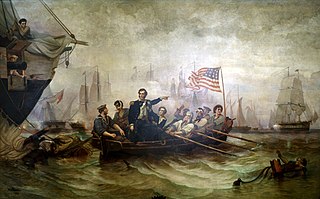
The Battle of Lake Erie, also known as the Battle of Put-in-Bay, was fought on 10 September 1813, on Lake Erie off the shore of Ohio during the War of 1812. Nine vessels of the United States Navy defeated and captured six vessels of the British Royal Navy. This ensured American control of the lake for the rest of the war, which in turn allowed the Americans to recover Detroit and win the Battle of the Thames to break the Indian confederation of Tecumseh. It was one of the largest naval battles of the War of 1812.
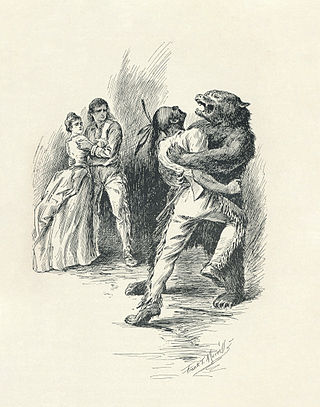
The Last of the Mohicans: A Narrative of 1757 is a historical romance novel written by James Fenimore Cooper in 1826. It is the second book of the Leatherstocking Tales pentalogy and the best known to contemporary audiences. The Pathfinder, published 14 years later in 1840, is its sequel; its prequel, The Deerslayer, was published a year after The Pathfinder. The Last of the Mohicans is set in 1757, during the French and Indian War, when France and Great Britain battled for control of North America. During this war, both the French and the British used Native American allies, but the French were particularly dependent, as they were outnumbered in the Northeast frontier areas by the British. Specifically, the events of the novel are set immediately before, during, and after the Siege of Fort William Henry.

David Porter was an officer in the United States Navy in the rank of captain and the honorary title of commodore. Porter commanded a number of U.S. naval ships. He saw service in the First Barbary War, the War of 1812 and in the West Indies. On July 2, 1812, Porter hoisted the banner "Free trade and sailors' rights" as captain of USS Essex. The phrase resonated with many Americans. Porter was later court martialed; he resigned and then joined and became commander-in-chief of the Mexican Navy. Porter County, Indiana was named after him.

William Cooper was an American merchant, land speculator and developer, the founder of Cooperstown, New York. A politician, he was appointed as a county judge and later served two terms in the United States Congress, representing Otsego County and central New York. He was the father of James Fenimore Cooper, who became a noted writer of historical novels related to the New York frontier.

William Branford Shubrick was an officer in the United States Navy. His active-duty career extended from 1806 to 1861, including service in the War of 1812 and the Mexican–American War; he was placed on the retired list in the early months of the Civil War.

USS Scourge was an American warship converted from a confiscated Canadian merchant schooner. She and the American warship Hamilton foundered at 2:00am on Sunday, August 8, 1813 during a squall on Lake Ontario. during the War of 1812.
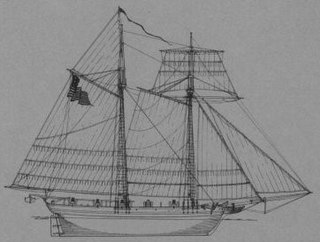
The first USS Hamilton was a United States Navy schooner which served on Lake Ontario from 1812 to 1813 during the War of 1812.

The Armdale Yacht Club is a yacht club located on Melville Island, at the head of Halifax Harbour's Northwest Arm in Nova Scotia, Canada. The Club was founded in 1937 and was established at its current location in 1947. The Club is known for founding the Bluenose fleet.
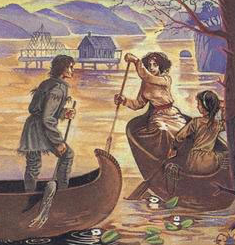
Nathaniel "Natty" Bumppo is a fictional character and the protagonist of James Fenimore Cooper's pentalogy of novels known as the Leatherstocking Tales.
William Sheldon Dudley is a naval historian of the United States Navy, who served as Director of Naval History and Director, Naval Historical Center, Washington, D.C. from 1995 to 2004.

Enoch Crosby (1750–1835) was an American spy and soldier during the American Revolution. His life may have been the basis for the character Harvey Birch in James Fenimore Cooper's novel The Spy.
Peter Rowe is a Canadian filmmaker and author specializing in themes of history and exploration. He is the producer of the 49-part television series Angry Planet, which airs on streaming and television networks around the world. His book, Music vs The Man was published in 2020.
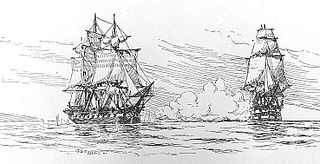
The Chesapeake–Leopard affair was a naval engagement off the coast of Norfolk, Virginia, on June 22, 1807, between the British fourth-rate HMS Leopard and the American frigate USS Chesapeake. The crew of Leopard pursued, attacked, and boarded the American frigate, looking for deserters from the Royal Navy. Chesapeake was caught unprepared and after a short battle involving broadsides received from Leopard, the commander of Chesapeake, James Barron, surrendered his vessel to the British. Chesapeake had fired only one shot.
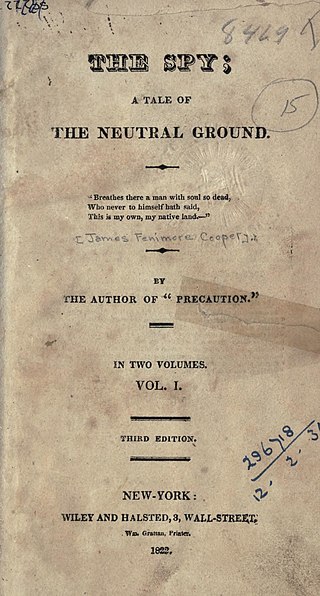
The Spy: a Tale of the Neutral Ground is a novel by American writer James Fenimore Cooper. His second novel, it was published in 1821 by Wiley & Halsted. The plot is set during the American Revolution and was inspired in part by the family friend John Jay. The Spy was successful and began Cooper's reputation as a popular and important American writer.

Nautical fiction, frequently also naval fiction, sea fiction, naval adventure fiction or maritime fiction, is a genre of literature with a setting on or near the sea, that focuses on the human relationship to the sea and sea voyages and highlights nautical culture in these environments. The settings of nautical fiction vary greatly, including merchant ships, liners, naval ships, fishing vessels, life boats, etc., along with sea ports and fishing villages. When describing nautical fiction, scholars most frequently refer to novels, novellas, and short stories, sometimes under the name of sea novels or sea stories. These works are sometimes adapted for the theatre, film and television.
Afloat and Ashore is a nautical fiction novel by James Fenimore Cooper first published in 1844. Set in 1796–1804, the novel follows the maritime adventures of Miles Wallingford Jr., the son of wealthy New York landowners who chooses to go to sea after the death of his parents. The novel ends abruptly part way through, and is followed by what critic Harold D. Langely called a "necessary" sequel which resolves many thematic and plot elements. The novel is partially autobiographical, based in part on Cooper's own experiences as a sailor, and is his first full-length novel to fully employ a first-person narrative.